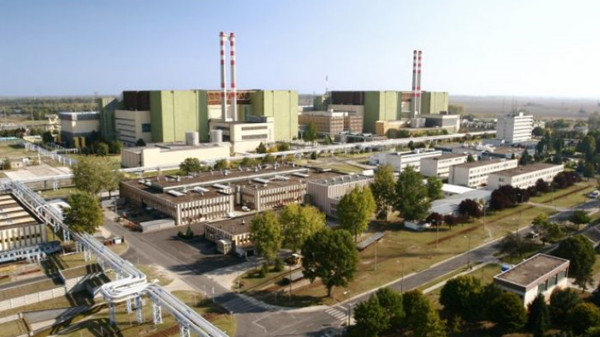The coronavirus pandemic has underlined the importance of the existing Paks nuclear power plant, which accounts for about half of Hungary's electricity generation, noted János Süli. The minister responsible for the design, construction and commissioning of two new reactors at Paks said that project will maintain the country's energy security and help revive its economy in the coming years.

The existing four-unit Paks plant (Image: Paks NPP)
Speaking to the TEOL news service, Süli noted that the Paks plant is Hungary's largest power generator. The electricity generated at Paks covers one-third of domestic consumption, representing the total demand of Hungarian households. "This is of strategic importance in these difficult times," he said. "Another important fact is that the nuclear power plant always has enough fuel for two years, as required by law. Nuclear fuel can be stored safely, in a small space and well stocked, and can be obtained from multiple sources when needed. This is much more secure than importing either electricity or natural gas."
The existing Paks plant, which is 100 km south of Budapest, comprises four Russian-supplied VVER-440 pressurised water reactors, which started up between 1982 and 1987. Russia and Hungary signed an inter-governmental agreement in early 2014 for Russian enterprises and their international sub-contractors to supply two VVER-1200 reactors at Paks, including a Russian state loan of up to EUR10.0 billion (USD10.9 billion) to finance 80% of the project, which is known as Paks II.
Süli said the current situation highlights the importance of the Paks II project for Hungary. "Our aim is to maintain the share of nuclear energy in domestic production," he said. "The four existing blocks will be phased out by 2032-37. Two new units will replace them. In this way, we can guarantee security of supply and, as in the current difficult situation, the availability of vital electricity.
"The fact that our country is highly dependent on electricity imports - almost the highest in the European Union - can now be seen as a real threat when countries are forced to close their borders. ... But today, one-third of [Hungary's] electricity demand comes from imports, typically covered by the purchase of electricity from fossil fuel power plants in the surrounding countries. The security of supply of Hungary cannot be based on foreign power plants."
Süli noted the significant economic impact of the COVID-19 epidemic, with thousands of Hungarians losing their jobs. "A major investment, such as the construction of two nuclear power plant units, could be a lifeline for many Hungarian businesses and a livelihood for many Hungarian people," he said, adding that the project will employ 8000-10,000 people at its peak.""There are a lot of related construction projects: roads, homes, factory halls need to be built, and workers coming here provide jobs for the service sector. It all means income, livelihood."